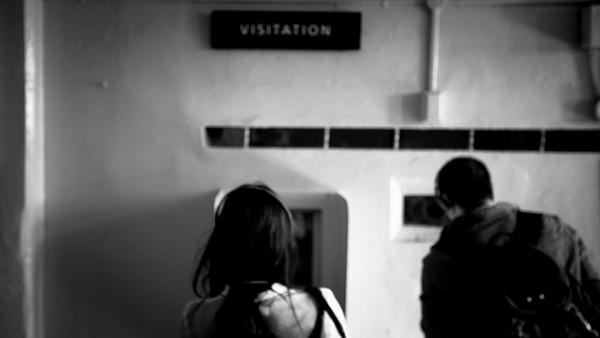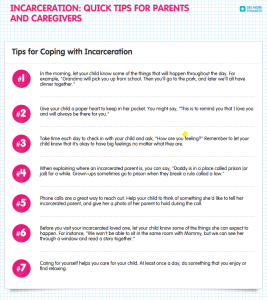
A very large number of Americans are held in jails and prisons – some 762 out of every 100,000 residents. Although the United States has only five percent of the world’s population, it holds one quarter of all the world’s prisoners. However, the social burdens occasioned by so much imprisonment are not borne equally by all segments of the American population. According to recent estimates, one of every 15 black men is held in jail or state or federal prison, compared to one of every 106 white males. This racial disparity has a big impact on the life fortunes of white and black men – contributing to gaps in many domains, ranging from jobs and family life to health and mortality.
But the social reverberations of mass incarceration do not stop with the prisoners themselves. The consequences can be even greater for children, family members, and associates attached to those who are imprisoned. A burgeoning research literature suggests that having a family member sent to prison damages the mental and physical health of those left at home. The imprisonment of a family member means one less person to contribute to household support, increasing stress and making everyone less economically secure.Although researchers have documented these indirect social impacts from imprisonment, they have been unable before now to estimate how many adult women and men are connected to an inmate – and therefore, have not been able to specify the scope of negative consequences faced by people tied to America’s prisoners. Now, for the first time, data from the 2006 General Social Survey make it possible to estimate the reach and wider social impact of the U.S. prison system. We use this data and build on previous studies to explore the impact of imprisonment on the family members and associates of black and white prisoners.

Blacks, Whites, and the Spillover Effects of Imprisonment
Utilizing the data from the General Social Survey, we developed national estimates of the number and percentage of black and white men and women who have an acquaintance, a family member, a neighbor, or someone they trust in prison. In addition, we estimate the percentage of each individual’s social network that consists of people in prison. Beyond simply counting contacts, this provides an alternate way to measure the overall impact of imprisonment on people’s social environments.
Overall, a very substantial number of men and women in the United States know at least one person who is currently incarcerated – a result that reflects the country’s high rate of incarceration. But our data also reveal the vast racial disparities in the social spillover effects of imprisonment in America. Black American men, we know, bear the brunt of the direct effects of serving time behind bars – with the effects lasting long after they leave prison and parole. Yet the larger spillover effects are also extraordinarily racially unequal for black and white families and communities.
- Connections to family members in prison range from 6% for white males to 44% for black females. Black women have five times more contacts to imprisoned individuals than white females, and black males have 3.6 times more imprisoned contacts than white males.
- Black women are far more likely than white women to know people in prison: 35% versus 15% for personal acquaintances; 44% versus 12% for family members; 22% versus 4% for neighbors; 17% versus 5% for someone they trust.
- Remarkably, the proportion of incarcerated individuals in the family network of an average black female is 8.5 times higher than for the typical white woman.
The Prison Boom Affects All Americans – But Black People the Most
Our results provide powerful evidence of the enormous impact of high rates of imprisonment on social life in the United States. People who go to prison are removed from families, neighborhoods, and friendship networks, leaving their children, partners, friends, and neighbors to bear greater economic burdens and social challenges in their absence. The devastation for families and communities has been enormous – especially for black Americans, whose daily lives and economic fortunes bear the brunt of the prison boom.
Our results document, not surprisingly, that social ties to imprisoned individuals reflect racially disparate rate of incarceration. With black men the persons most likely to end up behind bars, extraordinary numbers of black women have many more ties people in prison than non-prisoners in any other group. In practical terms, this means that America’s black women not only have more ties to family members, neighbors, and friends in prison. They also disproportionately experience the spillover effects harmful to health and social and economic wellbeing. As they meet life’s normal challenges, far too many black women in the United States must struggle with the economic deficits and stresses caused by the imprisonment of loved ones and associates.The lives of children and adults connected to U.S. prisoners have been extensively examined by other scholars, but ours is the first study to provide a statistical portrait of the social contacts and networks linked to imprisoned individuals. Our results suggest that we must think much more deeply about the tears in America’s social fabric occasioned by so much reliance on locking people up – especially the ruptured ties disproportionately experienced by black women, families, and neighborhoods.
Read more in Hedwig Lee, Tyler McCormick, Margaret Hicken and Christopher Wildeman, “Racial Inequalities in Connectedness to Imprisoned Individuals in the United States.” Du Bois Review (forthcoming).
See also “What Children Experience When Mothers, Fathers, or Both Parents Are Sent to Prison,” by Allison Dwyer Emory.

 Research to Improve Policy: The Scholars Strategy Network seeks to improve public policy and strengthen democracy by organizing scholars working in America's colleges and universities. SSN's founding director is Theda Skocpol, Victor S. Thomas Professor of Government and Sociology at Harvard University.
Research to Improve Policy: The Scholars Strategy Network seeks to improve public policy and strengthen democracy by organizing scholars working in America's colleges and universities. SSN's founding director is Theda Skocpol, Victor S. Thomas Professor of Government and Sociology at Harvard University.